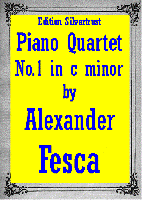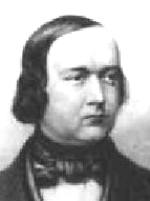Presents
Alexander Fesca
 |
 |
From the Septet |
Piano Quartet No.1 in c minor, Op.26
Fesca's Piano Quartet in c minor, Op.26 is a version of his Septet No.1 for Violin, Viola, Cello, Bass, Oboe, Horn and Piano which was published in 1842. It is not clear if Fesca made this version at the same time as the Septet. It seems probable that it was done shortly afterwards based on the fact that it was not published until 1844. The rationale for a second version would have most likely been premised on the fact that the Septet was not likely to be played very often, it being for an unusual ensemble, while piano quartets on the other hand, were quite popular at that time. The opening movement, Allegro con spirito, begins with a powerful, unison statement of the main theme. It promises turbulence but more lyrical passages follow. The lovely second movement, Andante con moto, opens with a long, dreamy theme. Next comes a fleet Scherzo, allegro vivo. The piano starts things off and then suddenly the rest join in. The music alternates between powerful thrusting episodes and softer and mysterious intermezzo-like passages. The treatment is quite fetching. The finale, Allegro con fuoco, also starts off unisono with a thumping introduction which is suddenly interrupted twice by a baroque sounding recitative. Finally, a very long-lined theme which is rather relaxed issues forth. But then the music turns frantic and hard driving. Op.26 though recorded in the septet version has not been recorded in the piano quartet version, so we have provided soundbites from the septet version which give a very accurate picture of the music.
Alexander Ernst Fesca (1820-1849) was born in the German city of Karlsruhe where his father Friedrich Ernst Fesca, also a composer, was serving as music director of the Ducal Court Orchestra of Baden. Fesca received his first lessons from his father and was considered a prodigy on the piano. He attended the Prussian Royal Conservatory in Berlin where he graduated with a degree in composition at the young age of 14 after which he enjoyed a career as a pianist and music director. Though he did not live very long, he composed a considerable amount of music. His chamber music includes six piano trios, two piano quartets and two septets for piano, winds and strings.
We have reprinted a very clean copy from the mid 19th century. Please be advised that the piano part is simply the piano part and not a piano score, but there are rehearsal letters. This is a fine work deserving of both concert performance and a place on the stands of amateurs.
Parts: $32.95